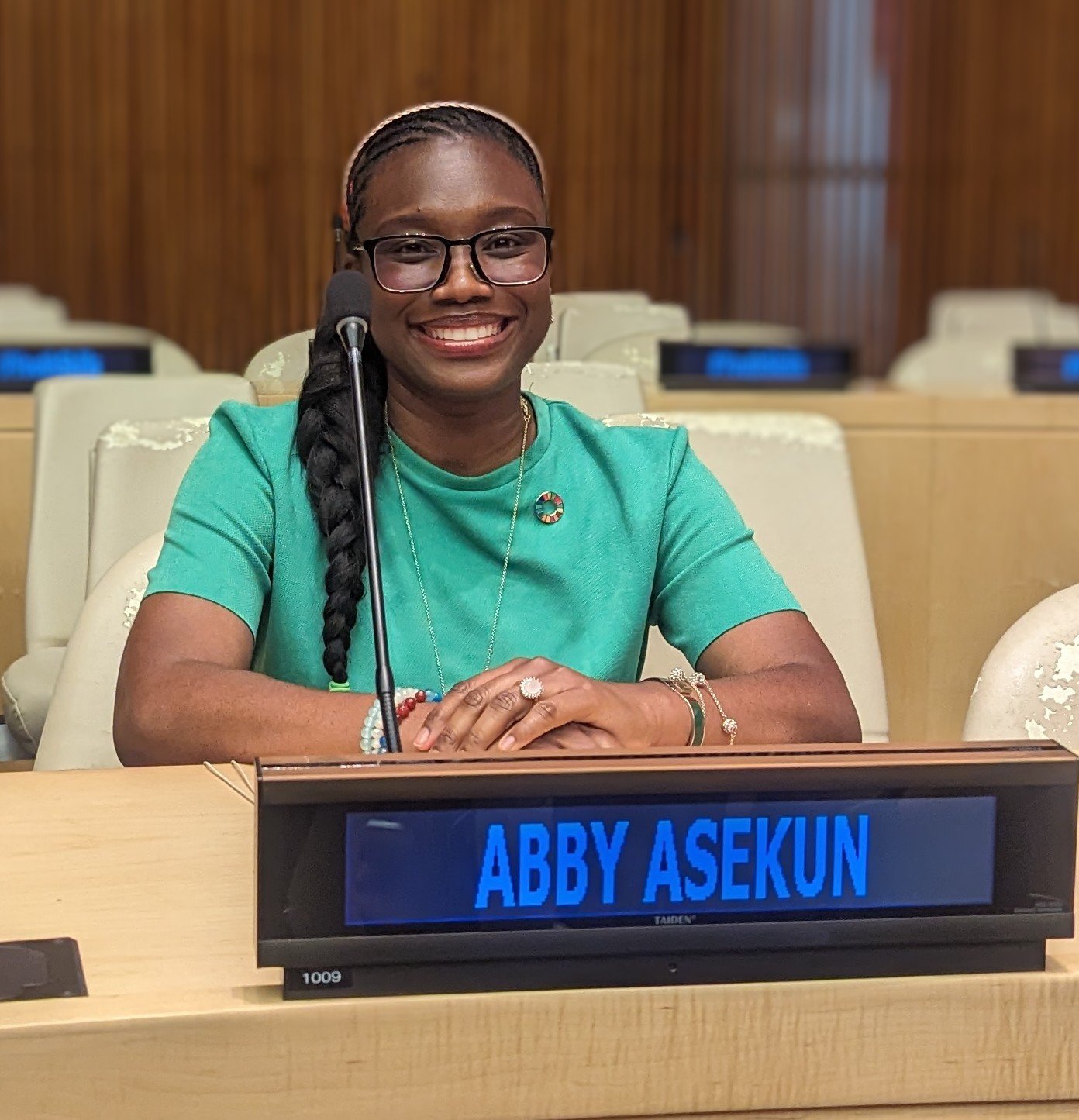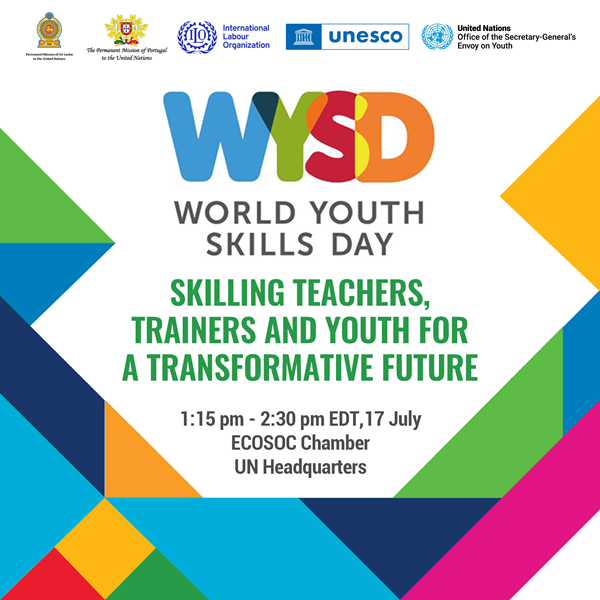2023 World Youth Skills Day
Skilling Teachers, Trainers, and Youth for a Transformative Future
To celebrate World Youth Skills Day 2023, the Permanent Missions of Portugal and Sri Lanka to the United Nations, in collaboration with UNESCO, the ILO and the Office of the Secretary General’s Envoy on Youth, convened a panel discussion with Member States, young experts, social partners, teachers, educators, and other stakeholders to:
Examine effective intergenerational acquisition of skills, including through mentorship, coaching, internships, quality apprenticeships and other forms of interactions across-generations. This should also highlight the individual and collective dimensions of lifelong learning; the learning to do and the learning to be/become.
Explore good practices in boosting the capacity and preparedness of teachers and trainers to respond to the emerging needs of societies and economies and to facilitate a smooth transition of young people from school to work.
Identify and share experiences from young teachers and trainers as they navigate their careers and inject innovative methods to equip young people with skills required to engage in their societies, communities and the world of work, including through work-based learning such as internships and quality apprenticeships.
Leverage the expertise and voices of young people as agent of change, givers and receivers of skills, while promoting an equitable intergenerational knowledge exchange.
Provide feedback and support to the High-Level Panel on the Teaching Profession.
Guest Speakers:
H.E. Mr. Francisco André, Secretary of State for Foreign Affairs and Cooperation
H.E. Mr. Peter Mohan Maithri Pieris, Permanent Representative of Sri Lanka to the United Nations
Mr. Gilbert Houngbo, Director General of the International Labour Organization (ILO)
Ms. Fathimath Zimna, International Trade Union Confederation (ITUC)
Ms. Agnes Vinblad, United States Council for International Business (USCIB)
Moazzam Syed, Founder of The Walkaway School & UNESCO SDG4Youth & Student Network member
Moderator:
Abby Asekun, Executive Director, Future Perspectives
Background
The challenges we face to achieve sustainable development can only be addressed through meaningful, inclusive and participatory intergenerational dialogue and cooperation. Collaboration among teachers, trainers and youth is an exemplary illustration of such partnership.
Inclusive, quality and relevant education and lifelong learning opportunities for all is a centerpiece of the 2030 Agenda for Sustainable Development and a fundamental human right. It facilitates social cohesion, addresses the climate crisis, drives inclusive economic growth and decent jobs, advances gender equality and promotes peace. It is an essential tool also for ensuring societies can navigate uncertain futures, as highlighted by Our Common Agenda.
Inclusive lifelong learning opportunities play a key role in granting equal access for youth to education, training and skills development, promoting decent work, securing livelihoods and career prospects and for active engagement in communities, including policy-making and decision-making processes. It can act as a powerful social equaliser and prepares societies for change and unforeseen crises. Increasing flexible opportunities for learning at work, within community and online contexts empowers people and enterprises to address the new challenges created by a fast-paced twin digital and green transition as well as challenges created by the informal economy and in rural livelihoods. The development of future-proofed core technical and socio-emotional skills, such as problem solving and communication, allows individuals to adapt to change and explore career pathways otherwise closed. It also enables enterprises, including micro, small and medium enterprises (MSMEs), to be more sustainable, to develop resilience and adaptability to change, to enhance productivity and to generate decent work opportunities. It enables successful job transitions, mobility between jobs, firms and even sectors, as well as transitions into formal employment with adequate social protection. Ultimately, it has positive impacts on the income levels of vulnerable groups. Finally, it encourages sustainability, political participation, democracy, and participation in civic space.
Education and training should prepare present and future generations to face evolving and complex challenges, including climate change, loss of biodiversity, threats to peace and social cohesion. Evidence shows that education and training systems are struggling to equip individuals with the knowledge, skills, and attitudes needed to flourish and thrive in a rapidly changing world. This is reflected in barriers to meaningful youth engagement, high rates of unemployment, gender inequalities, and more.
Teachers, trainers and other educators play an essential role in providing skills for youth to transition into the labour market and to actively engage in their communities and societies. Young teachers and educators have been crucial in integrating technology-based and –enhanced solutions in the classroom and to promote sustainability and innovative pedagogies. Their innovations have prompted opportunities to address digital divides while securing the continuity of learning during schools and technical and vocational education and training (TVET) institutions’ closures induced by the COVID-19 pandemic. Education staff of all ages – ranging from teachers, administrators and trainers to education support personnel – need to enhance and upgrade their skills and knowledge and be supported to effectively respond to the lifelong learning needs of individuals in a rapidly evolving world of work. A new generation of educators will need to support lifelong learning that enables people to acquire knowledge and skills, to reskill and upskill, encompassing formal, non-formal and informal learning from early childhood and basic education through to TVET, tertiary education and adult learning.
Young people, governments, workers and employers, as well as educational institutions and civil society organizations, have complementary responsibilities in building and nurturing an effective and appropriately financed lifelong learning ecosystem. This shared responsibility was stressed during the 2022 Transforming Education Summit (TES), which was grounded in the leadership of young people.
TES benefited from the strong engagement and participation of young people, which also resulted in the Youth Declaration on Transforming Education, presenting the collective vision, demands, and commitments of youth on transforming education. Youth Declaration consultations engaged nearly half a million young people from over 170 countries.
In the Youth Declaration, young people called for decision-makers to “invest in future-proof skills development, technical and vocational training, quality apprenticeships and other relevant opportunities to ensure access to decent jobs for youth, especially for members of vulnerable and marginalized communities” (Article 16). They also demanded decision-makers to facilitate the provision of “quality and relevant training, professional development, necessary facilities, appropriate working conditions, and an innovative, safe, and enriching environment for teachers, including by raising the status of the profession, and particularly by working with young teachers, women teachers, refugee teachers, and representatives of teachers’ unions” (Article 18).
Since teachers, trainers, school leaders and education support personnel are workers themselves, they require support in the transition to a lifelong learning ecosystem. There is widespread recognition that the quality of teachers is the single most influential variable for achieving learning outcomes. As education systems respond to rapid developments and digitalization, there is a vital need to examine the role of educators and how they can respond to the challenges of the future of work in a sustainable way. At the same time, they must benefit from opportunities to enhance their professional skills and meet their own lifelong learning goals.
In this context and within the framework of TES, the Secretary-General called for the creation of a High-Level Panel on the Teaching Profession to produce a new vision and a set of recommendations on the teaching profession for the benefit of teachers, students, parents, and education systems worldwide. The report of the High-Level Panel will serve to inform the preparations for the SDG Summit and the Summit of the Future, the work of dedicated global and regional bodies on the teaching profession, and the broader follow-up to the Transforming Education Summit, which is being led by the SDG 4 High Level Steering Committee. This high-level panel will also base its work on relevant International Labour Standards, including the 1966 ILO / UNESCO Recommendation concerning the Status of Teachers and the 1997 Recommendation concerning the Status of Higher Education Teaching Personnel.
One model of learning stands above others as a priority for future proofed education and training that benefit both business growth and the employability of individuals: work-based learning, including internships, quality apprenticeships and alternance. Therefore, ILO constituents chose to develop a new International Labour Standard on the subject that is expected to be adopted at the 2023 International Labour Conference. This recommendation shall provide an international framework for the promotion and regulation of apprenticeships, that have an important potential not only for the market relevance of the skills of young people, but also for the new roles of instructors and their interaction with the private sector.









